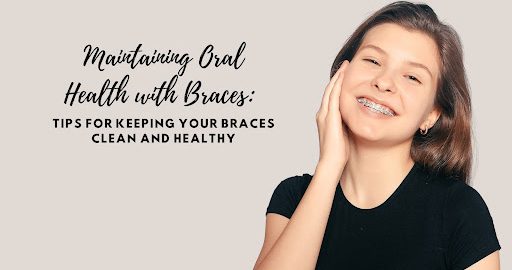
August 28, 2023


Orthodontic treatment, which often involves the use of braces, has the potential to be a life-changing experience. It can transform misaligned teeth into a beautiful, confident smile.
However, maintaining proper oral care during this process is essential for the success of the treatment and overall oral health. Braces create an environment that demands extra attention and care to prevent tooth decay, gum disease, and other dental problems.
In this article, we will explore the significance of oral care during orthodontic treatment and provide invaluable tips to help keep braces clean while maintaining excellent oral health.
Orthodontic treatment is a dental procedure designed to correct crooked, misaligned, or crowded teeth, as well as issues related to one’s bite. The primary tool used for this purpose is braces, which comprise brackets affixed to the teeth and wires that apply gentle pressure to move the teeth into their correct positions.
While highly effective, this process creates spaces where food particles and plaque can accumulate, making oral care more challenging.
During orthodontic treatment, maintaining impeccable oral hygiene is critical to avoid complications that could hinder progress or lead to permanent damage. Proper oral care offers many benefits, including:
Preventing Tooth Decay: Brackets and wires can trap food particles and plaque, increasing the risk of cavities and decay. Neglecting oral care could cause unsightly white spots or stains on the teeth after braces are removed.
Reducing Gum Disease Risk: Poor oral hygiene can lead to gum inflammation and gingivitis. Keeping gums healthy is essential for successful orthodontic treatment and overall oral health.
Avoiding Bad Breath: Food particles and plaque accumulation can cause bad breath, leading to social discomfort and decreased confidence.
Shortening Treatment Time: Consistent oral care and avoiding damage to the braces can prevent delays in treatment progress, leading to shorter overall treatment time.
A. Brushing: Patients with braces should brush their teeth after every meal and before bedtime. Use a soft-bristled toothbrush and fluoride toothpaste, gently brushing all tooth surfaces, including around brackets and wires. Pay extra attention to the gumline and areas where plaque can accumulate.
B. Flossing: Flossing can be more challenging with braces, but it is vital to remove plaque and food particles from between teeth and under wires. Dental floss threaders or orthodontic flossers can make flossing easier and more effective.
C. Interdental Brushes: These small, cone-shaped brushes can reach areas that regular toothbrushes and floss cannot. They are excellent for cleaning around brackets and wires.
D. Mouthwash: An antimicrobial mouthwash can help reduce bacteria and keep the mouth fresh. However, it should not replace brushing and flossing, which are essential for plaque removal.
E. Regular Dental Check-ups: Regular visits to the dentist or orthodontist are essential during orthodontic treatment. They can monitor progress, identify issues, and provide professional cleanings.
During orthodontic treatment, certain foods can damage braces or increase the risk of oral health problems. Patients should avoid:
Hard and Sticky Foods: These can damage brackets and wires. Examples include popcorn, hard candies, chewing gum, ice, and sticky snacks like caramel or taffy.
Sugary and Acidic Foods: These can contribute to tooth decay and erosion. Limit the consumption of sugary drinks, candies, and acidic fruits.
Nuts and Seeds: Small particles can get stuck in braces and cause discomfort or lead to oral health issues.
For individuals taking part in sports or other physical activities, it is essential to protect the braces from potential damage.
Orthodontic treatment can cause some discomfort or soreness, especially after adjustments. Rinsing with warm salt water or using orthodontic wax can help ease irritation and sore spots inside the mouth.
Maintaining proper oral care during orthodontic treatment is crucial for achieving optimal results and preserving overall oral health. By following the tips provided in this article, patients can keep their braces clean and healthy, ensuring a successful and comfortable orthodontic journey. Remember that good oral hygiene habits developed during orthodontic treatment will benefit you long after your braces are removed, giving you the confidence to share your beautiful smile with the world.
© Aries Oro-Facial Dental Clinic & Implant Center 2023. All rights Reserved.
Created by Dr Tushar Chauhan